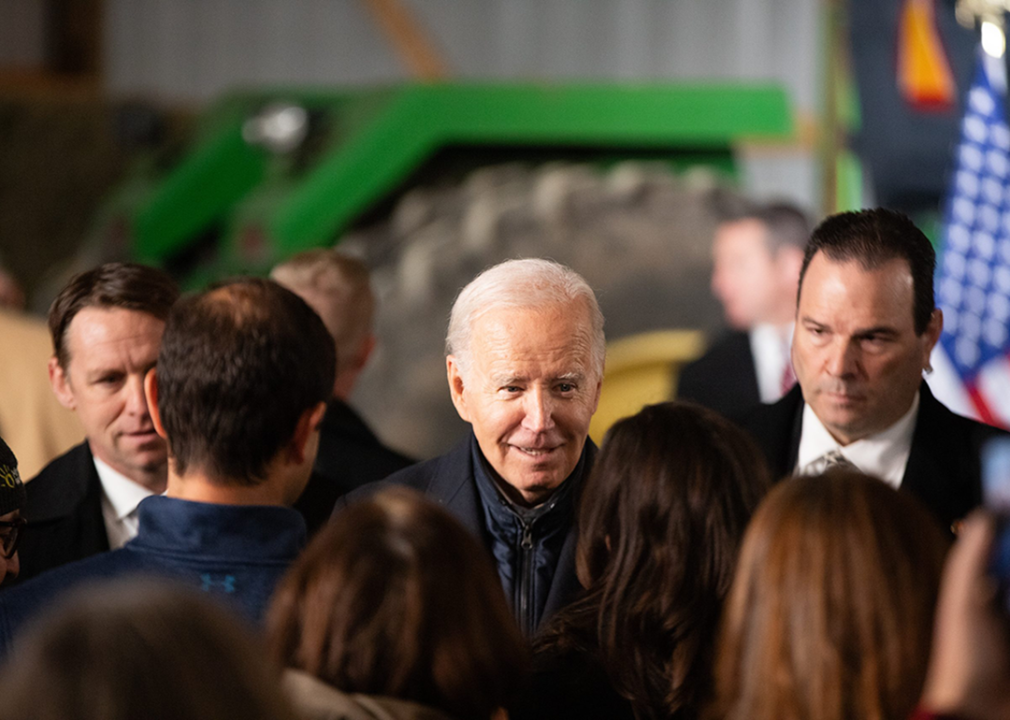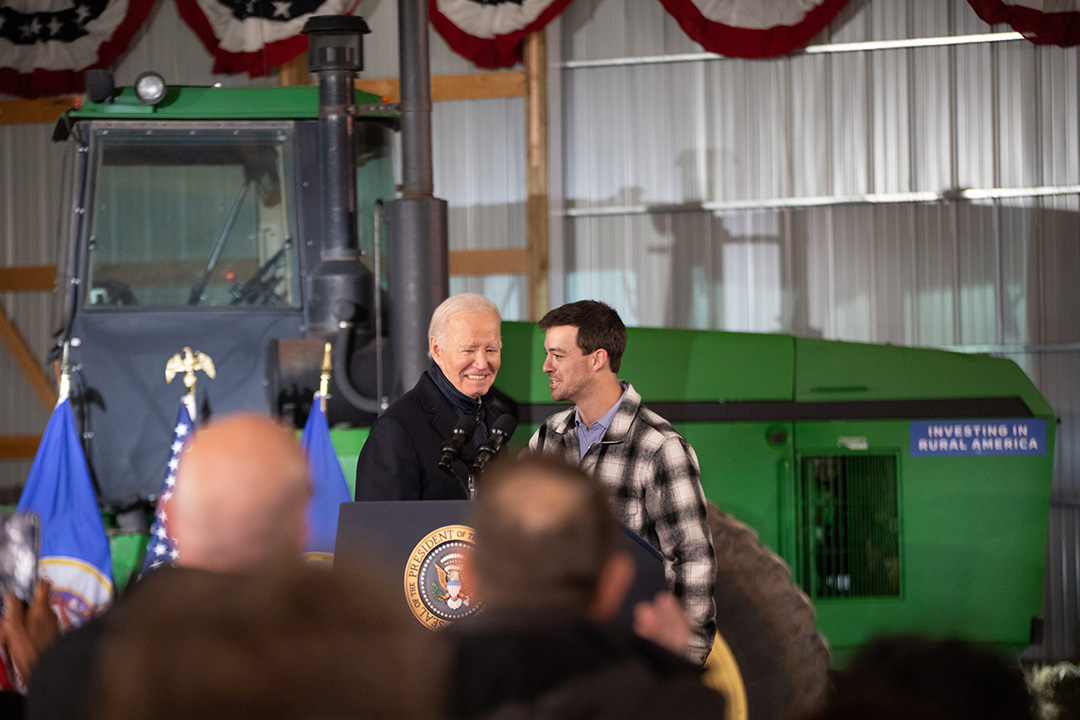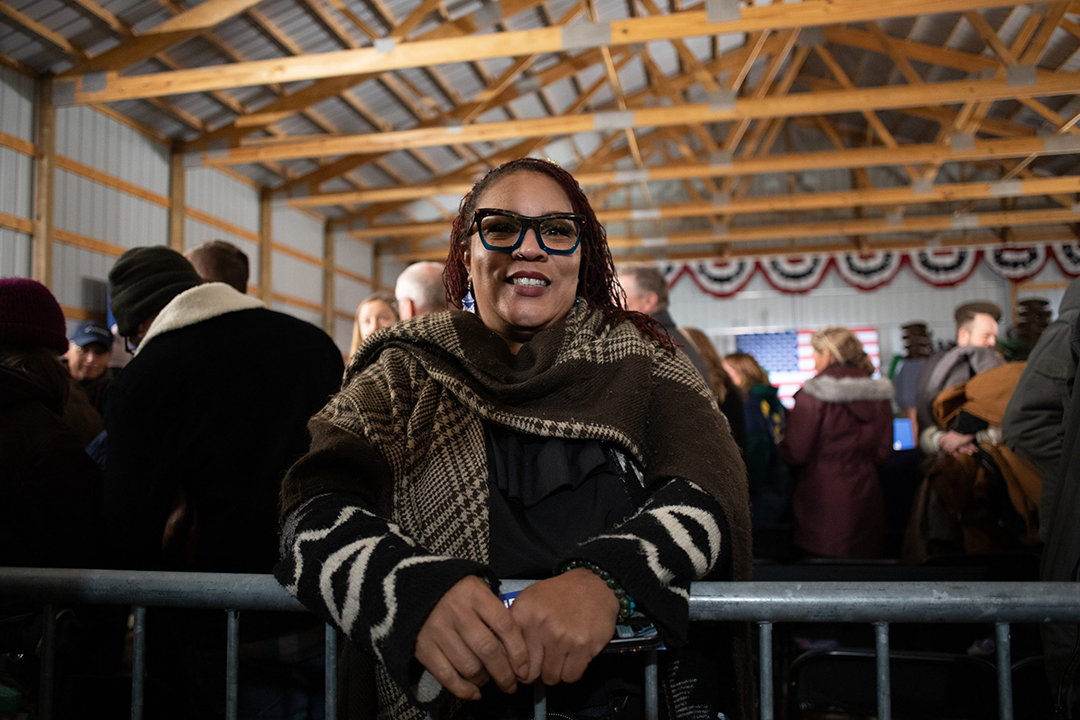Biden touts rural achievements as part of "barnstorming" tour

H. Jiahong Pan
Biden touts rural achievements as part of “barnstorming” tour
President Joe Biden talks to attendees at Dutch Creek Farms in Dakota County, Minnesota on the first stop of his rural investment tour.
In November 2023, the Biden administration put on a two-week national rural “barnstorm” designed to take the administration’s accomplishments to rural America, which could be a pivotal part of the 2024 presidential election.
President Biden kicked off the tour with a speech at Dutch Creek Farms, a farm located in Minnesota’s southern Dakota County, on November 1. Biden, who faces a tight reelection race, focused on how he was improving rural life for farmers struggling because of the pandemic and climate change. As The Daily Yonder found, while some of his remarks resonated with rural attendees, for others they fell flat.
The calculus in Minnesota
This Minnesota family farm was the only event Biden attended himself during the rural tour, which included stops in urban cities such as Indianapolis, too. He may have prioritized Minnesota as part of his strategy to win votes in 2024. Though the farm in Dakota County where he spoke is not rural by federal definition — it is one of seven counties that comprise the Twin Cities metropolitan area — it is about three miles north of rural Rice County, where Biden lost to Trump by less than a point.
He is also struggling to raise funds from Minnesota donors. As of September 2023, former President Donald Trump raised just over $580,000 from Minnesota donors, more than Biden’s $388,000. And an Emerson College poll from October 2023 showed Biden held only a slight two-point lead over Trump when the president’s rural tour was underway.
Meanwhile, a national poll indicated that economic issues are top-of-mind among rural voters.
Results of the poll, conducted by the Center for Rural Strategies and Lake Research Partners, were released the same day Biden spoke in Minnesota. It found that rural voters were concerned most about the high cost of goods, affordable housing, and corporate greed. Biden’s speech also came about a month after a Reuters poll found 71% of rural Americans disapproved of his presidential performance.
![]()

H. Jiahong Pan
Putting money in rural America
Brad Kluver of Dutch Creek Farms, speaking with President Joe Biden, is a third-generation farmer.
Photo: Brad Kluver of Dutch Creek Farms, a third-generation farmer, speaking with President Joe Biden.
Speaking inside a barn on the 81-acre Dutch Creek Farms property, Biden talked about his efforts to enhance rural quality of life, mostly through an agricultural lens. These efforts include money to grow cover crops to address climate change, money to foster smaller meat processing plant operations, and money for broadband, clean water, roads, and electricity. Biden hopes this will address the high cost of goods, deter corporate greed, and ensure rural people can afford to stay in rural America.
Biden plans to invest nearly $1.7 billion for more “climate-smart” agriculture practices, an additional $2 billion to increase health care and affordable housing access in rural communities whose leaders work together through the Rural Partners Network, $1.1 billion to repair rural electrical and water infrastructure, $145 million for farmers to install clean energy generating technologies like solar panels, and an additional $274 million to expand high-speed internet to rural communities.
This is on top of the $1 billion he already invested through the American Rescue Plan to support small and medium-sized meat processors. In his speech, Biden talked about Brad Kluver, the owner of Dutch Creek Farms, who had to sell his hogs on social media when larger meat processing plants closed at the beginning of the pandemic.
“And instead of … depending on one income stream and being at the mercy of the commodity markets and the big corporations, under our plan, farmers can diversify and earn additional income just [by] selling into the local markets,” said Biden in his speech. “Because of these investments we’re making, family farms like this one will stay in the family, and children and grandchildren like Brad won’t have to leave home to make a living.”

H. Jiahong Pan
Hope and anxiety
Angela Dawson, a hemp farmer from Pine County, Minnesota
Photo: Angela Dawson, a hemp farmer from Pine County, Minnesota is hopeful about some of Biden’s efforts.
Some who attended believed Biden is doing a good job. Angela Dawson, a Black hemp farmer in Pine County, halfway between the Twin Cities and Duluth, Minnesota, applauded Biden’s attempts to address racial injustice in farming, even though they were ultimately struck down by a federal judge.
“I do feel [Biden has] made some good efforts. I think specifically farmers of color have been usually the last priority for a lot of administrations. This is the first time that we’ve been put a little higher on the priority list, and I’d like to see that continue,” said Dawson, who mentioned that the Black farming population dwindled by more than 90% over the past 100 years.
Rodrigo Cala agreed. Cala, who works for the Latino Economic Development Center, a St. Paul-based organization that supports economic development for Latino families, received a grant from the USDA, bankrolled by the American Rescue Plan and the Inflation Reduction Act, to strengthen small farmers’ access to land, capital, and markets. The organization plans to help aspiring Latino farmers purchase land in Minnesota, the Dakotas, and Wisconsin starting next year.
Cala also said the Biden administration still needs to do more for farmers of color. “Who’s going to be the next generation of farmers in this country? The average age of farmers is 58 years old,” said Cala, who also mentioned that the country – and particularly rural communities – is diversifying.
One of these next-generation farmers is Tessa Parks, who is of white, Japanese, and Filipino descent. She and her husband moved to Minnesota to run a farm in the same Dakota County township where Biden spoke.
The Parks came to Minnesota because they couldn’t afford to live in Washington, let alone start a farm there. “[I would need] to win the lottery. We would go bankrupt before we could have any animals on the ground,” said Tessa Parks. “I miss my mom’s cooking. I miss my grandma’s cooking. I tear up when I get my favorite teriyaki chicken and gyoza.” Tessa added that climate change is another factor that led them to start a farm in Minnesota.
In a phone call with the Daily Yonder after Biden’s speech, Parks said she wanted to hear more about health care and child care. “[So that] I won’t go bankrupt if I choose to have a child. We shouldn’t have to worry about taking care of ourselves versus paying the mortgage, or having enough money to put gas in the car to even get to the job that we need to pay for our farm to pay for our house, pay for food,” she said.
Parks was also concerned about getting help on the farm, especially if she or her husband became ill. “We need to rely on other outside-of-family folks to lend us a hand sometimes,” she said. “Our dads aren’t able to jump on a tractor and lend help when we need it, because they’re in Washington [state].”
The Biden administration has worked to make health care accessible by cracking down on “surprise” bills and so-called junk plans, named because although they are affordable health care plans, they don’t cover much. The Biden administration is also asking a divided Congress for $16 billion to fund childcare nationwide.
Still, it’s not comforting for Parks, who has health insurance with a high deductible and had medical debt from an illness that she just finished paying off. While Parks and her husband farm in their free time, they also work full-time jobs advancing sustainable farming practices. They currently can’t afford to live on their farm and instead live in neighboring Rice County.
“When he was explaining his investments in rural America and small family farms, it feels really targeted at established farms, multigenerational farms, specifically white landowners, not those of us who struggle to afford rent [on] land that [we] will put a lot of time and energy into maintaining and growing food, but ultimately have no security in,” said Parks.
Other stops on the rural tour
Biden was joined in Minnesota by Agriculture Secretary Tom Vilsack. Shortly afterward, Vilsack traveled to Indianapolis to speak about the Farm Bill, improving electrical infrastructure in rural Indiana, and engaging youth in agriculture, at the National Future Farmers of America convention in Indianapolis. Vilsack also met with the Western Governors’ Association in Wyoming to talk about how farmers can address climate change, and delivered opening remarks at a water symposium at Colorado State University.
Other cabinet appearances included Deputy Secretary of Agriculture Xochitl Torres Small, Interior Secretary Deb Haaland, Energy Secretary Jennifer Granholm, Veteran Affairs Secretary Denis McDonough, Deputy Secretary of Veteran Affairs Tanya Bradsher, Education Secretary Miguel Cardona, Centers for Disease Control director Mandy Cohen, and others. These stops covered funding for rural issues like meat processing and wastewater handling, electrical access and infrastructure, veteran affairs, education, and health care.
This story was produced by the The Daily Yonder and reviewed and distributed by Stacker Media.